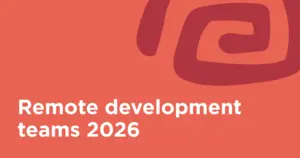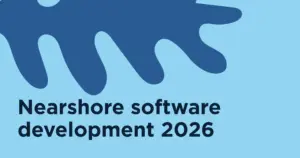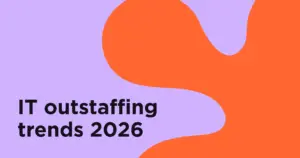The front-end development landscape is changing fast, and 2025 will be a year of innovation and growth. Whether you’re a seasoned developer or just starting, knowing which skills to prioritize can set you apart. Today, we’re diving into the must-have skills every front-end web developer needs to succeed and thrive in this ever-evolving field. So grab a coffee, and let’s get started!
1. Mastering HTML, CSS, and JavaScript
Think of HTML, CSS, and JavaScript as the bread and butter of front-end development. They’re not just tools but the foundation upon which every web page stands. Knowing these inside out allows you to create web pages that are not just functional but also visually appealing and interactive.
In 2025, it’s not just about writing clean code. It’s about knowing the latest updates, such as CSS Grid and the newest ES2025 features in JavaScript, which simplify complex tasks. For example, CSS Grid makes creating layouts a breeze, while JavaScript updates help you write cleaner and faster scripts.
To deepen your understanding, bookmark the Mozilla Developer Network (MDN) for tutorials and references—it’s a lifesaver.
2. Becoming Fluent in Frameworks and Libraries
If HTML, CSS, and JavaScript are your foundation, frameworks, and libraries are your power tools. Frameworks like React, Angular, and Vue.js are game-changers, making development faster and more efficient. Each has its strengths:
- React: Perfect for creating dynamic and highly interactive user interfaces.
- Angular: Ideal for robust, enterprise-level applications.
- Vue.js: Known for its simplicity and flexibility, making it a favorite among beginners and pros alike.
Here’s a pro tip: specialize in one framework but be familiar with the others. This flexibility makes you more adaptable and valuable to teams. To see how these frameworks compare, check out FreeCodeCamp’s guide.
3. Mastering Version Control with Git
Imagine working on a project where you can’t keep track of changes—chaos, right? That’s why Git is a must. It’s the backbone of version control, letting you manage and collaborate on code seamlessly. Platforms like GitHub and GitLab are where the magic happens.
Learning Git can feel overwhelming at first, but the payoff is immense. Whether you’re working solo or in a team, Git ensures you’ll never lose track of your progress. If you’re a beginner, start with Git’s official documentation.
4. Building for Mobile-First and Responsive Design
Here’s a fact: more than half of all web traffic comes from mobile devices. As a front-end developer, your job is to ensure that websites look stunning on screens of all sizes. This is where mobile-first design comes in.
Tools like Bootstrap and Tailwind CSS are invaluable for creating responsive designs. They take the guesswork out of grid layouts, typography, and spacing, so you can focus on creativity. Want to dive deeper? Smashing Magazine has excellent resources on responsive design.
5. Optimizing Web Performance
Nobody likes a slow website. Users will bounce if a page takes more than three seconds to load. As a front-end developer, performance optimization should be at the top of your list.
Techniques like code splitting, image compression, and leveraging browser caching can make a world of difference. These methods not only improve user experience but also boost your site’s SEO ranking.
For actionable advice, visit Google’s Web.dev Performance Guide.
6. Understanding Back-End Basics
You might think, “I’m a front-end developer. Why do I need to know about back-end development?” Here’s the deal: understanding back-end concepts like REST APIs, GraphQL, and server-side rendering makes you a better collaborator. It also gives you the tools to troubleshoot issues and build more efficient applications.
This doesn’t mean you need to be a full-stack developer, but knowing how the back end works will make you stand out.
7. Strengthening Soft Skills
Yes, technical skills are crucial but don’t underestimate the power of soft skills. As a front-end developer, you’ll work closely with designers, project managers, and other developers. Strong communication and teamwork skills can make all the difference.
Here are a few soft skills to focus on:
- Problem-solving: Debugging is part of the job. The quicker you find solutions, the more valuable you become.
- Time management: Deadlines are real, and juggling multiple tasks is the norm.
- Adaptability: The tech world changes fast. Being open to learning new tools and methods is essential.
8. Staying Updated with Industry Trends
Technology doesn’t stand still, and neither should you. In 2025, trends like WebAssembly, Progressive Web Apps (PWAs), and AI-powered interfaces are gaining traction. Staying informed through blogs, webinars, and online courses ensures you remain competitive.
Follow resources like CSS-Tricks or Smashing Magazine to keep your skills sharp.
Conclusion: Your Path to Success
The role of a front-end web developer in 2025 is as exciting as it is challenging. By mastering the skills we’ve outlined and staying curious, you’ll be ready to tackle any project that comes your way.
At Yoocollab, we’re here to help companies find top-tier development talent. Whether you’re a business looking to scale or a developer eager to work on exciting projects, our outstaffing services connect you with the right opportunities.
Contact us today to learn how we can help you build a brighter future in tech.




